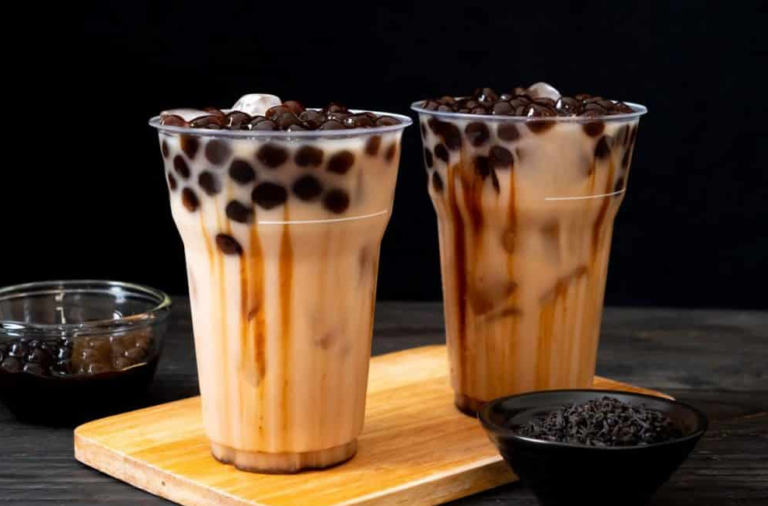Hey there, bubble tea enthusiasts! If you’re a Muslim who loves the chewy goodness of tapioca pearls and the refreshing flavors of bubble tea, you might be wondering: “Is bubble tea halal?“
Well, let me dive into this topic and give you a comprehensive look at the ingredients, potential concerns, and regional variations to help you enjoy this trendy Taiwanese beverage while adhering to Islamic dietary laws.
Disclaimer: This article is for informational purposes only. It’s always best to consult with a qualified Islamic scholar for specific guidance on halal matters.
What is Bubble Tea?
Before we get into the reality of whether bubble tea is halal or not, let’s quickly go over what it is.
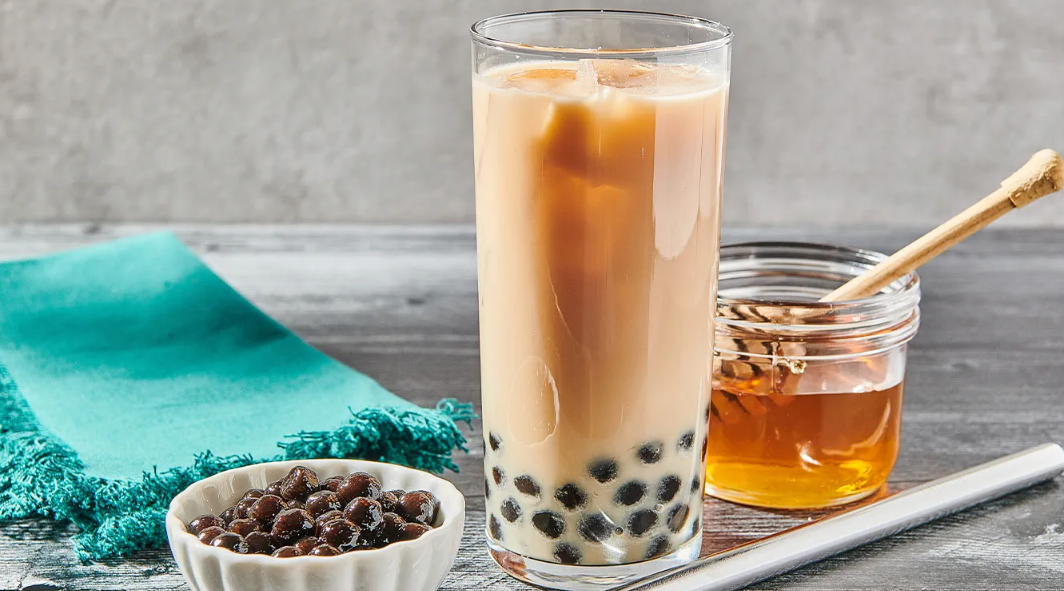
Bubble tea, also known as boba tea or pearl milk tea, is a fun and flavorful drink that originated in Taiwan in the 1980s. It typically consists of three main components:
- Tea Base: Black, green, or oolong tea is commonly used as the base.
- Milk or Fruit Flavoring: Bubble tea can be made creamy with milk, or fruity with the addition of fruit purees or syrups.
- Tapioca Pearls (Boba): These chewy, black pearls made from tapioca starch are the signature element of bubble tea, giving it a fun and unique texture.
Now, let’s dive into the halal considerations for each of these components.
Is Bubble Tea Halal?
Most bubble tea ingredients like tapioca pearls, tea, milk, and fruit flavors are halal by default.
However, exercising caution regarding potential non-halal additives, sweeteners, and cross-contamination is advised to ensure complete adherence to Islamic dietary laws.
The Halal Status of Tapioca Pearls (Boba)
One of the most crucial ingredients in bubble tea is the tapioca pearls, also known as boba or pearls. These chewy balls are made from tapioca starch, which is derived from the cassava root plant.
The good news is that tapioca pearls are generally considered halal because they don’t contain any prohibited ingredients like pork or alcohol.
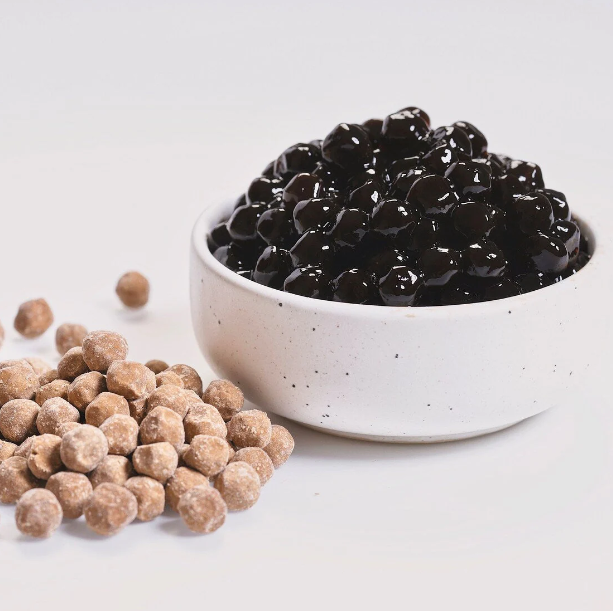
Tapioca pearls are vegan and gluten-free, making them a safe choice for those following halal dietary guidelines.
However, it’s always a good idea to double-check with the specific bubble tea shop or manufacturer to ensure that their tapioca pearls don’t contain any additives or flavorings that might not be halal.
The Halal Status of Tea Bases
Most bubble tea shops offer a variety of tea bases, including black, green, and oolong teas.
Plain, unflavored teas are typically considered halal, as they are plant-based and don’t contain any prohibited ingredients.
However, it’s essential to be cautious of any added flavorings or syrups, as some of these might contain alcohol or other non-halal ingredients.
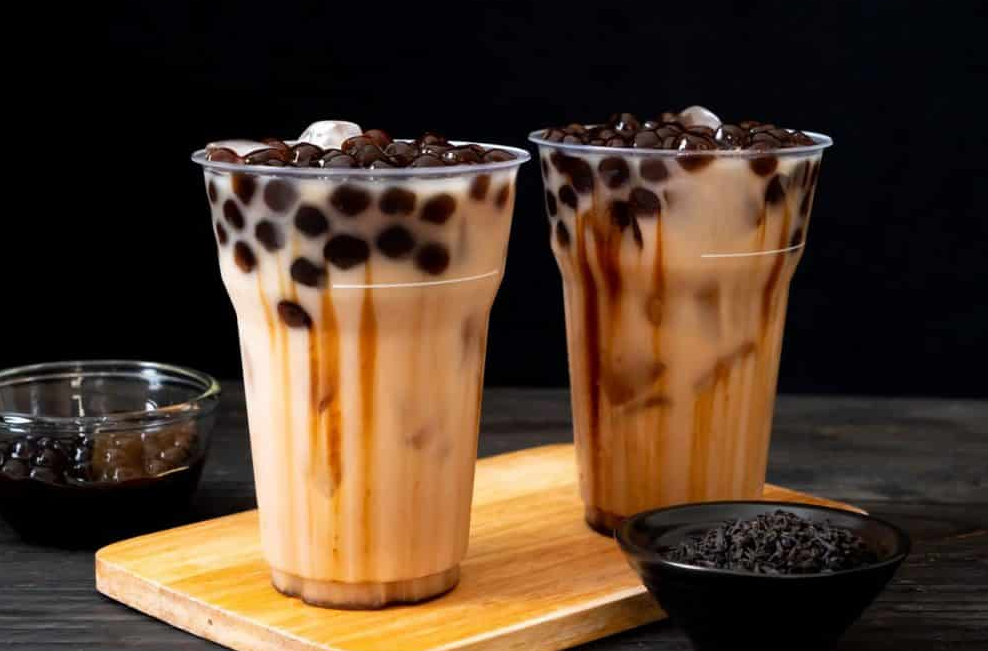
If you’re unsure about the ingredients used in a particular tea base, don’t hesitate to ask the staff at the bubble tea shop for clarification.
The Halal Status of Milk and Fruit Flavorings
Bubble tea can be made with either milk or fruit flavorings, and the halal status of these ingredients depends on their sources and preparation methods.
Milk
If the milk used in bubble tea is derived from halal sources (e.g., cow’s milk, goat’s milk), it is generally considered permissible for Muslims. However, it’s essential to ensure that the milk doesn’t contain any non-halal additives or flavorings.
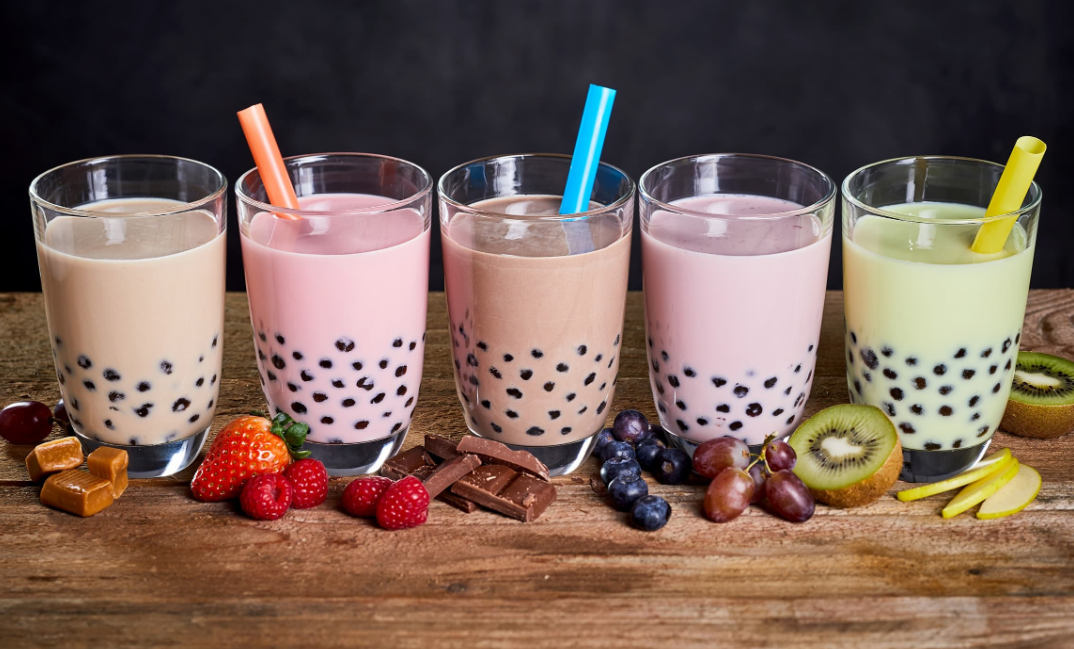
Fruit Flavorings
Most fruit purees, syrups, and juices used in bubble tea are halal, as they are plant-based. However, it’s always a good idea to check the ingredient list for any potential non-halal additives or flavorings.
Potential Halal Concerns with Bubble Tea
While the main ingredients in bubble tea can be halal, there are a few potential concerns to be aware of:
- Alcohol-Based Flavorings: Some bubble tea shops might use alcohol-based flavorings or syrups, which are not halal. It’s crucial to inquire about the ingredients used and avoid any alcohol-based additions.
- Non-Halal Sweeteners: While white and brown sugars are generally halal, some bubble tea shops might use non-halal sweeteners like honey (which is not permissible for vegans) or other non-halal additives.
- Cross-Contamination: If the bubble tea shop doesn’t have separate equipment or utensils for handling halal and non-halal ingredients, there is a risk of cross-contamination, which can render the bubble tea non-halal.
Regional Variations and Their Impact on Halal Considerations
It’s worth noting that bubble tea has gained popularity worldwide, and different regions might have their own unique variations and ingredients.
For instance, in Muslim-majority countries like Malaysia and Indonesia, bubble tea shops might be more mindful of catering to halal dietary requirements.
However, it’s still essential to inquire about the specific ingredients and preparation methods used, as regional variations can introduce potential halal concerns.

For example, some variations might use coconut milk or condensed milk, which could contain non-halal additives or flavorings.
Is Tea Less Acidic Than Coffee?
Tips for Enjoying Halal Bubble Tea
Now that you have a better understanding of the halal considerations surrounding bubble tea, here are some tips to help you enjoy this tasty treat while adhering to Islamic dietary laws:
- Ask Questions: Don’t be afraid to inquire about the ingredients and preparation methods used at the bubble tea shop. Most reputable establishments should be able to provide you with accurate information.
- Look for Halal Certifications: Some bubble tea shops might have halal certifications or labels on their products, which can give you added assurance about their halal status. You can check websites like the Islamic Food and Nutrition Council of America (IFANCA) for information on halal certification.
- Stick to Simple Flavors: If you’re unsure about the ingredients used in certain flavors or toppings, it might be safer to stick to simple options like plain milk tea or fruit teas.
- Consider Making Your Own: If you’re concerned about the halal status of bubble tea from commercial shops, you can always try making your own at home using halal-certified ingredients.
- Be Mindful of Cross-Contamination: If you’re ordering from a bubble tea shop that also serves non-halal items, be mindful of potential cross-contamination and consider asking for separate utensils or equipment to be used.
Can You Put Sea Moss in Hot Tea?
Conclusion: Enjoy Bubble Tea Responsibly
In conclusion, bubble tea can be halal if it is made with halal-certified ingredients and prepared in a way that avoids cross-contamination with non-halal items.
While the main components like tapioca pearls, tea, and fruit flavors are generally halal, it’s crucial to be vigilant about any potential non-halal additives, flavorings, or regional variations.
Remember, it’s always better to err on the side of caution and ask questions when in doubt.
